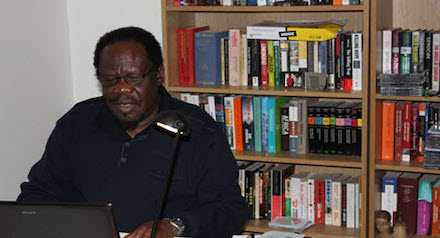The author at work. Photo: www.alexodora.com
[Book Review]
Hybrid Courts: Lessons From Rwanda and Sierra Leone, by Obote-Odora
Reviewed by Drew White, Q.C.
(Freedom World Publishers, Stockholm, 2021), 493pp
The most recent book from esteemed legal scholar Dr. Obote-Odora is a robust contribution in his efforts bending us toward justice.
For anyone with even a passing interest about international justice “Hybrid Courts: Lessons from Rwanda and Sierra Leone” will help provide answers to some of the more persistent questions about the legal framework that has developed, thus far.
War crimes, crimes against humanity and even genocide are all covered by formal prohibitions and sanctions, so why are civilians bearing the brunt of violence during armed conflict? Why do the rules for protection of civilians favor aggressors? Why is the legal system so challenged to deliver justice? Why is fighting impunity for conflict in Africa so problematic? Why is the United Nations not living up to its expectations and delivering on its promises?
“Hybrid Courts” treats each of these questions with specific references to the existing laws and examples drawn from jurisprudence of the Rwanda and Sierra Leone criminal tribunals, with comparative references to the tribunal for the former Yugoslavia. Woven throughout the text is the thesis that the law categorizing the rules of non-international armed conflict is flawed, insufficient for the purposes of humanitarian protection and deeply euro-centric. The consequence of this bias has meant that armed conflicts in an African context have been systematically left without substantial legal protection.
We are all witnessing the early stages in the development of a comprehensive system of international justice. “Hybrid Courts” goes a considerable way towards explaining how we got where we are and where we need to go before the system can mature into an effective deterrent and a challenge to impunity.
Divided into five substantive chapters, each one leading the reader progressively through aspects of legal history combined with the operative underlying legal concepts, such as the topics of the Geneva and Hague conventions, the protection of civilians, trial processes and criminal responsibility at the tribunals. Along the way the author points out opportunities and provides suggestions for law reform with the objective to sufficiently protect civilians, the civilian population and civilian objects during a non-international armed conflict in Africa, towards the end result that ”victims and survivors would greatly benefit”.
As the need for international criminal justice grows exponentially each year, as the numbers of armed conflicts multiply and spin-off new conflicts and as impunity spreads like a virus, the analysis within “Hybrid Courts” demonstrates that in the long arc of the moral universe, we can bend toward justice, to paraphrase Dr. Martin Luther King, Jr.
Drew White, Q.C. is former International Criminal Tribunal for Rwanda (ICTR) Prosecuting Counsel.












